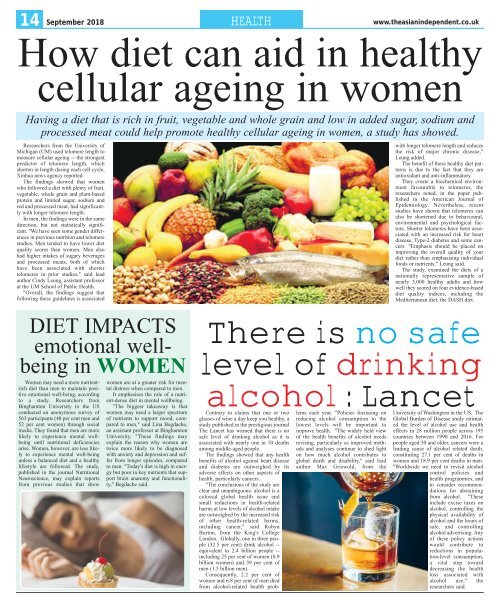September 2018
Create successful ePaper yourself
Turn your PDF publications into a flip-book with our unique Google optimized e-Paper software.
14 <strong>September</strong> <strong>2018</strong><br />
HEALTH<br />
www.theasianindependent.co.uk<br />
How diet can aid in healthy<br />
cellular ageing in women<br />
Having a diet that is rich in fruit, vegetable and whole grain and low in added sugar, sodium and<br />
processed meat could help promote healthy cellular ageing in women, a study has showed.<br />
Researchers from the University of<br />
Michigan (UM) used telomere length to<br />
measure cellular ageing -- the strongest<br />
predictor of telomere length, which<br />
shorten in length during each cell cycle,<br />
Xinhua news agency reported.<br />
The findings showed that women<br />
who followed a diet with plenty of fruit,<br />
vegetable, whole grain and plant-based<br />
protein and limited sugar, sodium and<br />
red and processed meat, had significantly<br />
with longer telomere length.<br />
In men, the findings were in the same<br />
direction, but not statistically significant.<br />
"We have seen some gender differences<br />
in previous nutrition and telomere<br />
studies. Men tended to have lower diet<br />
quality scores than women. Men also<br />
had higher intakes of sugary beverages<br />
and processed meats, both of which<br />
have been associated with shorter<br />
telomeres in prior studies," said lead<br />
author Cindy Leung, assistant professor<br />
at the UM School of Public Health.<br />
"Overall, the findings suggest that<br />
following these guidelines is associated<br />
with longer telomere length and reduces<br />
the risk of major chronic disease,"<br />
Leung added.<br />
The benefit of these healthy diet patterns<br />
is due to the fact that they are<br />
antioxidant and anti-inflammatory.<br />
They create a biochemical environment<br />
favourable to telomeres, the<br />
researchers noted, in the paper published<br />
in the American Journal of<br />
Epidemiology. Nevertheless, recent<br />
studies have shown that telomeres can<br />
also be shortened due to behavioural,<br />
environmental and psychological factors.<br />
Shorter telomeres have been associated<br />
with an increased risk for heart<br />
disease, Type-2 diabetes and some cancers.<br />
"Emphasis should be placed on<br />
improving the overall quality of your<br />
diet rather than emphasising individual<br />
foods or nutrients," Leung said.<br />
The study, examined the diets of a<br />
nationally representative sample of<br />
nearly 5,000 healthy adults and how<br />
well they scored on four evidence-based<br />
diet quality indices, including the<br />
Mediterranean diet, the DASH diet.<br />
DIET IMPACTS<br />
emotional wellbeing<br />
in WOMEN<br />
Women may need a more nutrientrich<br />
diet than men to maintain positive<br />
emotional well-being, according<br />
to a study. Researchers from<br />
Binghamton University in the US<br />
conducted an anonymous survey of<br />
563 participants (48 per cent men and<br />
52 per cent women) through social<br />
media. They found that men are more<br />
likely to experience mental wellbeing<br />
until nutritional deficiencies<br />
arise. Women, however, are less likely<br />
to experience mental well-being<br />
unless a balanced diet and a healthy<br />
lifestyle are followed. The study,<br />
published in the journal Nutritional<br />
Neuroscience, may explain reports<br />
from previous studies that show<br />
women are at a greater risk for mental<br />
distress when compared to men.<br />
It emphasises the role of a nutrient-dense<br />
diet in mental wellbeing.<br />
"The biggest takeaway is that<br />
women may need a larger spectrum<br />
of nutrients to support mood, compared<br />
to men," said Lina Begdache,<br />
an assistant professor at Binghamton<br />
University. "These findings may<br />
explain the reason why women are<br />
twice more likely to be diagnosed<br />
with anxiety and depression and suffer<br />
from longer episodes, compared<br />
to men. "Today's diet is high in energy<br />
but poor in key nutrients that support<br />
brain anatomy and functionality,"<br />
Begdache said.<br />
There is no safe<br />
level of drinking<br />
alcohol : Lancet<br />
Contrary to claims that one or two<br />
glasses of wine a day keep you healthy, a<br />
study published in the prestigious journal<br />
The Lancet has warned that there is no<br />
safe level of drinking alcohol as it is<br />
associated with nearly one in 10 deaths<br />
among middle-aged people.<br />
The findings showed that any health<br />
benefits of alcohol against heart disease<br />
lems each year. "Policies focussing on<br />
reducing alcohol consumption to the<br />
lowest levels will be important to<br />
improve health. "The widely held view<br />
of the health benefits of alcohol needs<br />
revising, particularly as improved methods<br />
and analyses continue to shed light<br />
on how much alcohol contributes to<br />
global death and disability," said lead<br />
University of Washington in the US. The<br />
Global Burden of Disease study estimated<br />
the level of alcohol use and health<br />
effects in 28 million people across 195<br />
countries between 1990 and 2016. For<br />
people aged 50 and older, cancers were a<br />
leading cause of alcohol related death,<br />
constituting 27.1 per cent of deaths in<br />
women and 18.9 per cent deaths in men.<br />
and diabetes are outweighed by its author Max Griswold, from the "Worldwide we need to revisit alcohol<br />
adverse effects on other aspects of<br />
control policies and<br />
health, particularly cancers.<br />
"The conclusions of the study are<br />
clear and unambiguous: alcohol is a<br />
colossal global health issue and<br />
small reductions in health-related<br />
harms at low levels of alcohol intake<br />
are outweighed by the increased risk<br />
health programmes, and<br />
to consider recommendations<br />
for abstaining<br />
from alcohol. "These<br />
include excise taxes on<br />
alcohol, controlling the<br />
physical availability of<br />
of other health-related harms,<br />
alcohol and the hours of<br />
including cancer," said Robyn<br />
Burton, from the King's College<br />
London. Globally, one in three people<br />
sale, and controlling<br />
alcohol advertising. Any<br />
of these policy actions<br />
(32.5 per cent) drink alcohol --<br />
would contribute to<br />
equivalent to 2.4 billion people --<br />
including 25 per cent of women (0.9<br />
billion women) and 39 per cent of<br />
men (1.5 billion men).<br />
reductions in population-level<br />
consumption,<br />
a vital step toward<br />
decreasing the health<br />
Consequently, 2.2 per cent of<br />
loss associated with<br />
women and 6.8 per cent of men died<br />
alcohol use," the<br />
from alcohol-related health prob-<br />
researchers said.
















